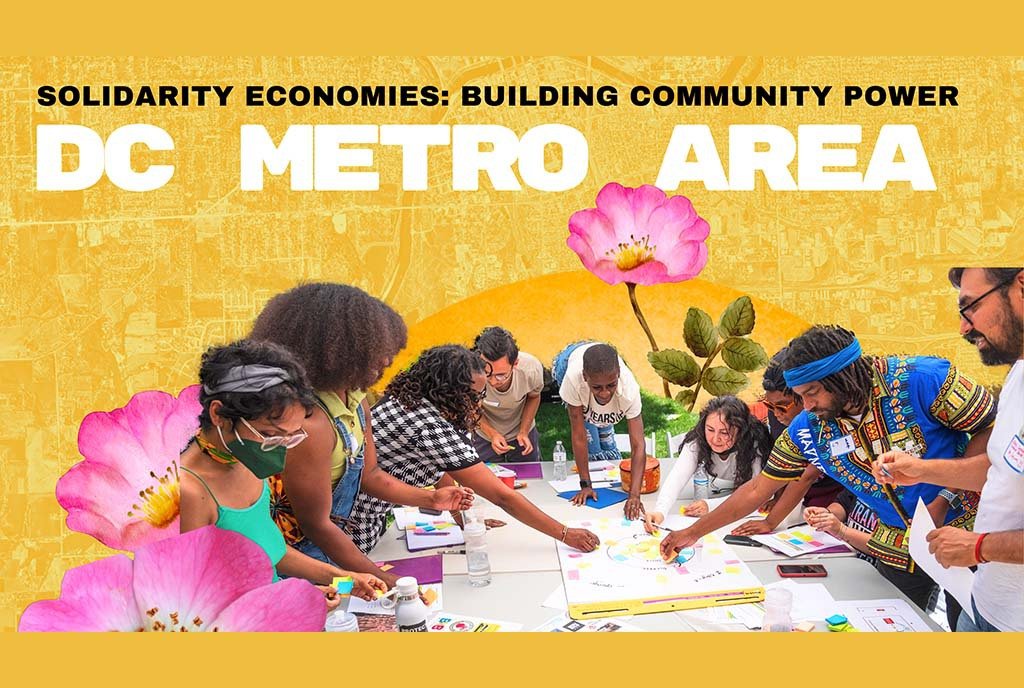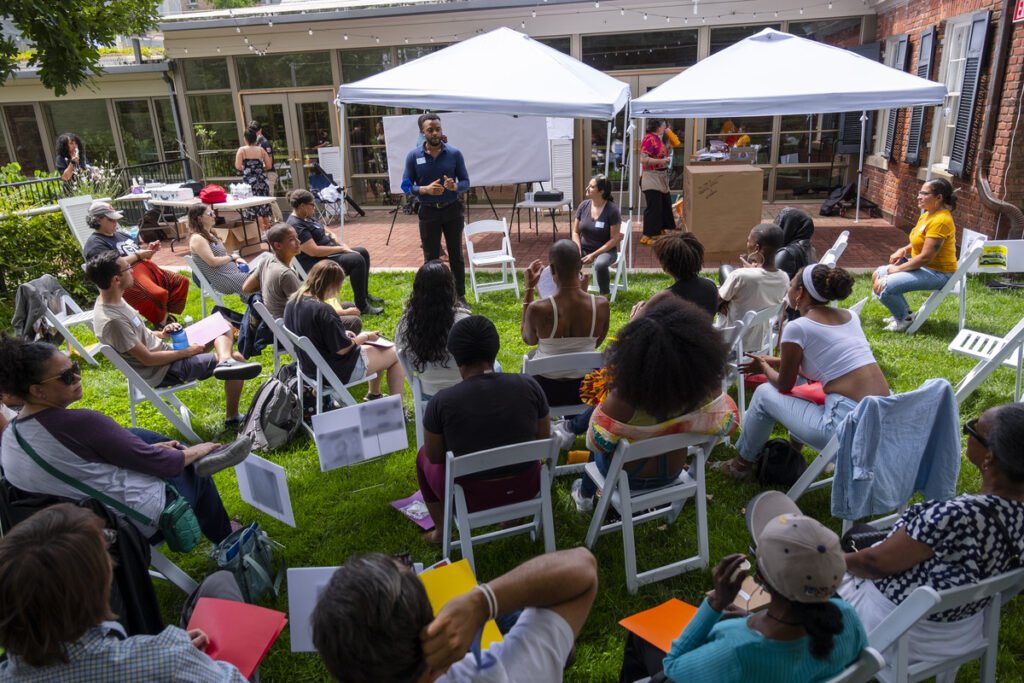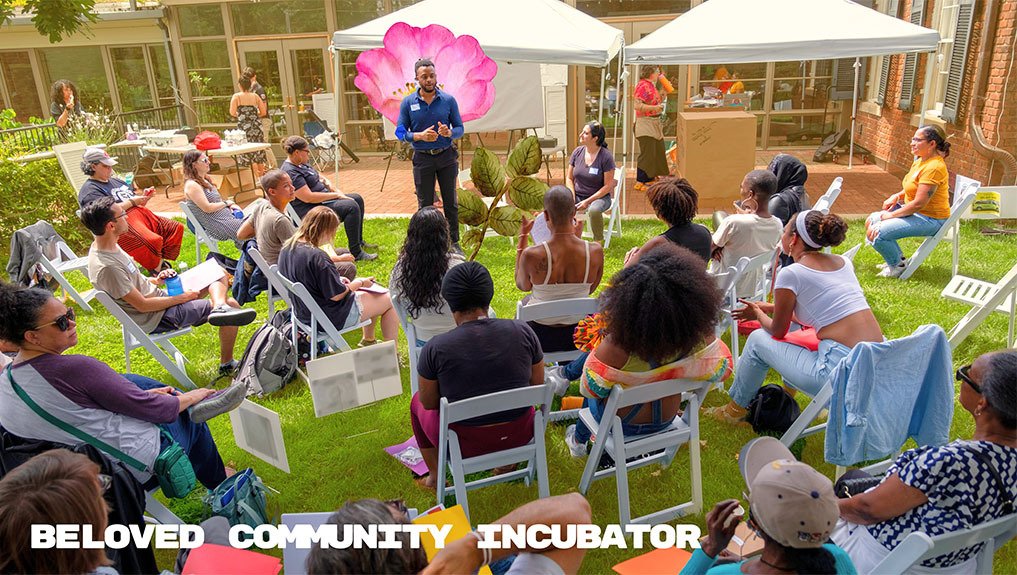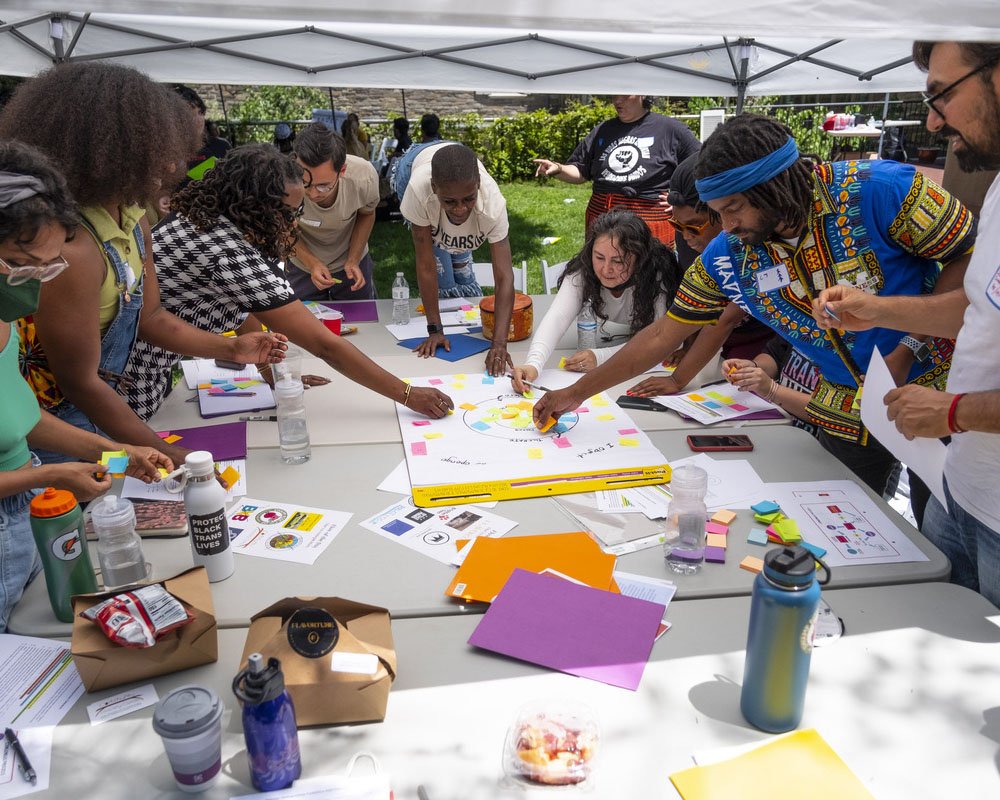
With this article, we conclude NPQ’s series Solidarity Economies: Building Community Power. Coproduced with the New Economy Coalition—a coalition of over 100 organizations building the solidarity economy in the United States—this series highlights case studies of solidarity economy ecosystems that are returning wealth and building grassroots power in cities across the country.
Spanish language version, translated by María Luisa Rosal and edited by Lila Arnaud, members of the BanchaLenguas Language Justice Collective is available here. Versión en español, traducido por María Luisa Rosal y eidtado por Lila Arnaud, integrantes de la Colective de justicia de lenguaje BanchaLenguas está acesible aquí).
Social movements must push to (re)claim ownership and control of land and economic resources for ordinary people—not mega-corporations and the wealthy few. Without this, there is no empowering the poor and working-class Black, Latine1, and Indigenous people, no equitable treatment for queer and trans people, and no worker solidarity and ecological sustainability. At Beloved Community Incubator (BCI), we believe we can move toward this vision of the world by building a regional solidarity economy in the District of Columbia, Maryland, and Virginia Region (the “DMV”).2
In 2016, BCI began through a neighborhood-based participatory action research process spanning hundreds of conversations. In these initial conversations, community members named worker rights violations and a desire to have more control over their own labor as their top concerns. BCI leaned into supporting neighbors and incubated our first co-op, Dulce Hogar (Sweet Home), beginning in 2018. As the region’s only Latina-owned cleaning coop, in five short years, Dulce Hogar has steadily increased earnings and pays wages that fall within the top ninetieth percentile of their industry.
The COVID-19 pandemic shifted our organizational focus toward solidarity economy ecosystem organizing. Over the past three years, the BCI network has grown to over a dozen co-ops and social justice organizations in DC, Maryland, and Virginia, representing more than 200 regional workers. How we have done so has required a multifaceted approach that combines deep organizing with legal and technical assistance, financing, and coalitions with other movement groups.

Why Co-ops?
Centering professionals makes the work easier….But this approach will not build a lasting solidarity economy.Cooperatives are a vital component within our broader vision of a solidarity economy—an economy prioritizing community accountability, equitable provision of goods and services, and democratic economic planning rather than maximum extraction, growth, and profit. Cooperatives of all kinds build collective, democratic ownership within our communities. We live in a world where ownership has been concentrated in large corporations and outside investors—gentrification, displacement of local businesses and families, and low-wage extractive work.
We think of cooperatives, whether of housing or workplaces, as anti-displacement strategies that allow residents to sustain themselves economically and thrive where they live. Cooperatives can ensure that the benefits of economic activity are distributed to more people—the workers, the tenants, the consumers, and others—who, in turn, own and direct these assets in ways that are accountable to their communities.

There Are No Shortcuts: Building Through Relationships
For many years, there have been efforts to organize a cooperative ecosystem in Washington, DC. However, many efforts have centered on cooperative professionals instead of worker-owners—a fundamental flaw.
Centering professionals makes the work easier: meetings can happen during business hours, and technology access and English literacy can be assumed. But this approach will not build a lasting solidarity economy. There are no shortcuts regarding relational work.
Rather than start with an outcome in mind, we listened to the group’s priorities and built programming to meet their stated needs.When the COVID-19 pandemic hit our communities, BCI organizers responded by contacting local area co-ops to see what kinds of support they needed. Through relational conversations, worker-owners revealed common concerns: the need for bookkeeping support, lawyers and accountants, and capital.
Worker-owners also said they felt isolated in their efforts. Many didn’t know other cooperatives existed in the region. Some of the most impacted workers worried about survival, feeding their families, and staying housed. We helped cooperatives apply for grants and raised thousands of dollars in grassroots funding to provide cash support for worker-owners ineligible for unemployment. We spent hundreds of hours relating to worker-owners in our region, and what people shared shaped and guided our efforts to support the ecosystem.
In December 2020, we held a virtual convening to begin visioning together. A team of worker-owners built the initial scaffolding of our membership program, which would provide back-end administration and other technical assistance in exchange for a sliding-scale (pay what you can) monetary pledge and a commitment to solidarity exchange with another group. Rather than start with an outcome in mind, we listened to the group’s priorities and built programming to meet their stated needs.
Over 75 percent of network member projects are led by poor and working-class people and/or Black and Latine people, queer people, and people of color. Network members also help to shape our vision and direction through annual meetings, working groups, and listening sessions.
This summer, our partners met in person for the first time to plan to build a regional solidarity economy. Participants included Dulce Hogar; Brighter Days, a dog-walking co-op; Swamp Rose Cooperative, a native plant nursery; Throneless, a queer tech co-op; Baldwin House, a tenant-owned housing co-op; and the Coalition of Concerned Mothers, a network of mothers who have lost children to police terror. All participants were connected to BCI through relational work and technical assistance.

Developing Community-Responsive Legal and Technical Assistance
The mundane and humble work of supporting co-ops to comply with city, state, and federal laws is a key factor in the long-term sustainability of co-ops and solidarity economy organizations. However, technical assistance requires more than assisting co-ops with compliance. For example, the Baldwin House Cooperative, a newly founded housing coop and community center, had to spend two years negotiating with the building owner and their legal counsel to find a viable path to tenant ownership.
While co-op organizers did the front-facing work of raising funds and organizing tenant-owners, BCI created with Baldwin House a “community mortgage”—a financial instrument compliant with federal and local securities law through which the co-op was able to raise more than $1.6 million in zero-interest loans, which enabled the group to ultimately purchase the property for $4 million. This type of less visible but necessary support makes the dream of community land control a reality.
Creating a Solidarity Economy Loan Fund
In 2021, BCI began the relational and infrastructure work necessary to create a regional loan fund for area co-ops. Our groups consistently named access to capital as a leading challenge. We began to work with Seed Commons, a national network of local worker co-op loan funds, to make financing available to cooperatively owned businesses that create jobs, build wealth, and challenge inequality.
All the loans made available through the Seed Commons network, including from the DC fund, are “non-extractive,” meaning that worker-owners are never worse off for taking a loan from the fund. A loan is written with the expectation that worker-owners will be paid a living wage and that loans will only be paid back out of unencumbered profits.
The ethos of lenders in the network can be summed up as relationships mitigate risk.
Within the first six months of launch, we got three loans approved (of the 11 that were approved nationally in that same period). Throneless Tech was the first cooperative to receive a loan from the DC Solidarity Economy Loan Fund and was quickly followed by two others. The speed at which we are moving now is a product of the deep, slow, and patient organizing work done during the first years of the pandemic. It is another reminder that there is no shortcut to organizing, and we must build slow to go fast.
Challenges to Ecosystem Organizing
Sign up for our free newsletters
Subscribe to NPQ's newsletters to have our top stories delivered directly to your inbox.
By signing up, you agree to our privacy policy and terms of use, and to receive messages from NPQ and our partners.
These advances do not come easily. Washington, DC, is one of the country’s most expensive places to live. Rent, whether residential or commercial, is high. Most of the successful cooperatives in our region are in industries that don’t require a brick-and-mortar location. For these reasons, it should not be surprising that building a solidarity economy ecosystem is difficult work. Here are some leading challenges:
- Limited funding for relational work
Both relational organizing and business development are slow processes. Ecosystem building does not neatly fall into traditional economic development or fit neatly within campaign organizing. Funders must know why this kind of relational economic development requires multiyear commitments.
- Economic exclusion
We believe in centering folks most marginalized from the traditional economy. This includes people with low literacy, immigrants, non-English speaking people, and formerly incarcerated people. We invest significantly in interpretation, hold meetings on nights and weekends, connect workers to local mutual aid networks, develop popular education curricula to make cooperatives and business ownership accessible, and provide direct support to workers navigating social safety-net programs.
- Building an ownership mindset
It’s great to displace the boss, but co-ops must also do the boss’s work—bookkeeping, inventory, marketing, and generating revenue to pay for salaries and benefits. There is a learning curve for worker-owners to learn systems and truly build and guide their business. Removing a traditional boss can create tension between workers, who need conflict resolution skills and infrastructure to succeed in collective decision-making and proactively about policy and strategy.
- Difficulties in creating and maintaining ecosystem infrastructure
The first dreams of the BCI Network were expressed in 2019 and 2020, but the immediate needs of individual workers and cooperatives consistently took priority, sometimes displacing broader network projects. For example, our idea to establish a paid sick day fund, which first circulated in 2019, is an initiative we haven’t had the internal bandwidth to implement.
- Inaccessibility of public benefits
Worker-owners find themselves in a unique position when applying for certain public benefits. Many small business relief programs require businesses to have a certain number of employees to be eligible, leaving cooperatives excluded. Also, worker-owners find themselves ineligible for traditional unemployment insurance as owners.
- A lack of pre-launch support
Without investment in pre-launch support, cooperatives are only accessible to people for whom business ownership is already an option—that is, people with access to wealth. Pre-launch support includes helping groups develop bylaws, decision-making, feasibility studies, marketing, start-up capital access, and additional stipends for low-wage workers or people who must turn down other work to attend meetings.
- Liberatory logistics are expensive
The term liberatory logistics can be attributed to Kandace Montgomery from the Black Visions Collective and refers to the logistics required for movement work to be truly inclusive. When the BCI Network convened this summer, we spent thousands of dollars to make the event accessible. We provided high-quality COVID tests and masks, childcare so parents could attend, and interpretation in both Spanish and Amharic. This is a fundraising challenge but key for inclusivity.
- Lack of trained technical assistance professionals
When a BCI organizer went to a small business workshop to ask for help with a cooperative business plan, the workshop leader told her it sounded like co-ops wouldn’t even be legal. This is not an isolated incident. Most cooperatives we know nationally use the same accounting firm. National groups are beginning to offer training for professionals, but our local legal needs significantly outpace capacity.
Building Coalitions and the Way Forward
An autonomous federation of solidarity economy organizations ready to mobilize people and resources is the face of our fundamental power building strategy for new labor.
Building a network doesn’t stop with strengthening and supporting individual co-ops or creating a regional network and loan fund. Only by making power together can communities take on the daily devastation of racialized capitalism.
Campaigns like the Excluded Worker Coalition—which won over $75 million in funding for undocumented workers over three years—exemplify how our solidarity economy efforts can overlap with traditional campaigns. BCI partnered closely with the DC chapters of the National Domestic Workers Alliance, Restaurant Opportunity Center, and Jobs With Justice. Worker-owners from Dulce Hogar and Vendedores Unidos (Vendors United), along with representatives from the other anchor organizations, served on the leadership council. We now intend to work with NDWA to build cooperatives of domestic workers, such as home healthcare workers and nannies.
Solidarity economy movements, including co-ops and mutual aid networks, often step in to protect people in the face of government abandonment. In 2022, Texas Governor Greg Abbott began busing migrants to DC, a political stunt that displaced thousands of people seeking asylum. Leaders from network co-ops served as volunteer organizers, with Dulce Hogar worker-owners cleaning locations where asylum-seekers were staying and Vendedores Unidos members cooking and delivering over 3,000 meals.
Engagement in grassroots, member-led campaigns is critical. But we aim to expand the definition of what is typically defined as “community organizing” by engaging in “solidarity economy” organizing.
We believe in the hyper-local human development of tenants, worker-owners, and stewards. An autonomous federation of solidarity economy organizations ready to mobilize people and resources is the face of our fundamental power building strategy for new labor. With this strategy, we’re confident we will win—shifting our region’s relationship away from capital and toward prioritizing our shared resources and ourselves.
Notes:
- In this article, we use “Latine” in place of “Latinx.” Latine (la·ˈti·ne) is a gender-neutral form of the word Latino, created by LGBTQIA+, gender nonbinary, and feminist communities and is used in Spanish-speaking communities.
-
BCI is a member of the New Economy Coalition, which has a clear and helpful definition of the solidarity economy:
The solidarity economy is a global movement to build a just and sustainable economy where we prioritize people and the planet over endless profit and growth. Growing out of social movements in Latin America and the Global South, the solidarity economy provides real alternatives to capitalism, where communities govern themselves through participatory democracy, cooperative and public ownership, and a culture of solidarity and respect for the earth….Regional solidarity economy ecosystems are essential building blocks for global economic transformation. A solidarity economy ecosystem is an environment where all of the things a community needs are controlled and governed by everyday people.













